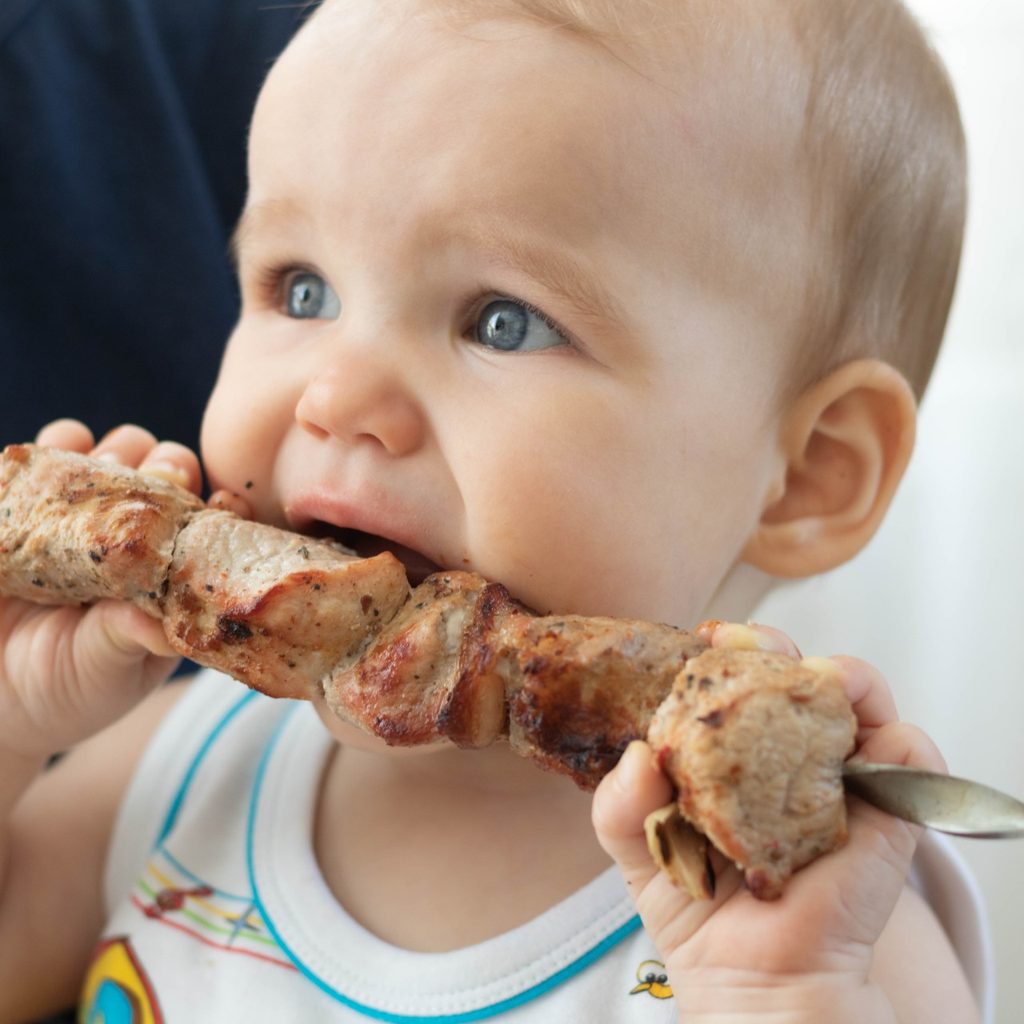Upgrading your baby’s diet can be an exciting thing for new parents. Gone are the days of baby food jars and pureeing produce in your kitchens. No more heavy food jars or pouches weighing down your diaper bags, filling up your pantries, or costing you an arm and leg at the grocery stores. When babies start making the jump from pureed foods to solids, it can feel like such a freeing thing for moms and dads. It also allows them the opportunity to introduce foods into their babies’ diets that are important not only nutrition-wise but also could be culturally important as well.
If you’re little one is approaching the age of 6 months, you are likely starting to explore the possibility of adding some protein into your baby’s diet. But when can babies eat meat? What steps should you take for introducing meat to baby? And are there any risk factors surrounding this big step in your baby’s life? We’ll discuss this, and more, and look at some hard-hitting, and nerve-calming facts about safely introducing your baby to meat.

Introducing meat to your baby
Have a conversation
Discussing your child’s diet with their pediatrician is a great first step on opening the dialogue on introducing new foods. If you aren’t sure on whether your baby is ready for solid foods, discussing it with their doctor is an important first step. Your baby’s pediatrician is highly and specially trained to not only treat their patients for any injuries or illnesses but also to recommend what comes next for baby. They are also in tune with your child’s needs and their progress and development. Some children are not ready for solids at the 6-month mark, for whatever reason. Your child’s doctor will have information to help you make their decisions and can explain in detail when the introduction of meats is safe. Underdeveloped airways, allergies, teeth development, and physical dexterity can all play a role in how quickly kids can move from the pureed to the solid forms of food.
Why the rush?
If you’ve taken the important first step of talking to your child’s pediatrician about exploring new foods like proteins and meats and have received the “all clear” to go for it, you may be wondering why experts suggest parents not wait long before introducing meat to their babies. It may come as a shock to some, but most formulas, baby foods, and homemade pureed produce often lack the necessary iron to support a healthy diet in little ones. Even cereals plastered with “added iron” marketing blurbs simply do not hold the necessary quantity of iron that is needed for your baby. Ironically, cereals are not absorbed well by baby’s body, making the manufacturer’s added iron supplements even less effective at meeting your baby’s dietary needs. Iron directly handles moving oxygen through your baby’s body and into their lungs, making it paramount for lung function. Iron also helps your baby’s muscles store and use oxygen. If your baby is lacking iron, this could mean their body could be lacking the crucial nutrients needed to aid them in their movement and development for crawling and walking.

What are the risks?
You may be wondering, “What happens if my child is lacking the necessary iron levels to support their body’s needs?” In the case of an iron deficiency — either biologically or due to lack of dietary iron supplementation – children can lack the nutrients needed for:
- Muscle development – This can greatly impact their progress in movement such as crawling and walking. Iron is key to helping muscles store and use oxygen and can cause muscle fatigue if iron is lacking in the body.
- Brain development – Iron is crucial in brain development. It is directly connected to the process of creating myelin — or the protective coating around nerves — in the brain, which can affect focus and attention in later years.
A few options for parents are:
- Pureeing meats at home, giving younger or less developed babies a safe and delicious option of much needed protein and iron.
- Adding iron drops directly into liquids or formulas, with oversight by your child’s pediatrician.
When it comes to babies and their diets, ensuring key nutrients are making into meals is a top priority for parents. While some may not realize how much their child’s diet may be lacking in the iron department, introducing them to foods high in iron such as meats or protein-enriched plant-based foods, is vital. Your baby’s brain, muscles, and lungs will thank you for it!



